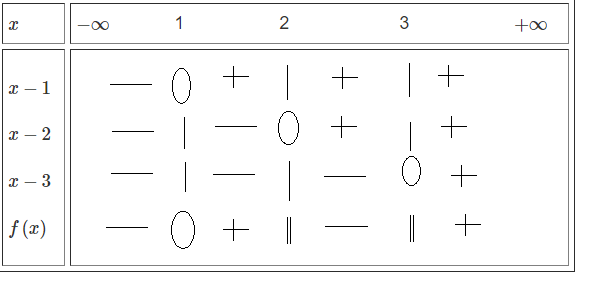Tập nghiệm của bất phương trình \({(0,2)^x} > 1\) là:
A. \(\left( { - \infty ;2} \right)\)
B. \(\left( {0,2; + \infty } \right)\)
C. \(\left( {0; + \infty } \right)\)
D. \(\left( { - \infty ;0} \right)\)
Tập nghiệm của bất phương trình \({\log _{\frac{1}{4}}}x > - 2\) là:
A. \(\left( { - \infty ;16} \right)\)
B. \(\left( {16; + \infty } \right)\)
C. \((0;16)\)
D. \(\left( { - \infty ;0} \right)\)
\(\log_{\dfrac{1}{4}}x>-2\\ \Rightarrow\left\{{}\begin{matrix}x>0\\\log_{\dfrac{1}{4}}x>\log_{\dfrac{1}{4}}16\end{matrix}\right.\\ \Leftrightarrow\left\{{}\begin{matrix}x>0\\x< 16\end{matrix}\right.\\ \Leftrightarrow0< x< 16\)
Chọn C.
Tập nghiệm của bất phương trình \(\dfrac{\text{x}-1}{\left(x-2\right)\left(x-3\right)}>0\) là:
A. \(\left(-\infty;1\right)\cup\left(3;+\infty\right)\) B. \(\left(1;2\right)\cup\left(3;+\infty\right)\)
C. \(\left(-\infty;1\right)\cup\left(2;3\right)\) D. \(\left(2;3\right)\)
Đặt \(f\left(x\right)=\dfrac{x-1}{\left(x-2\right)\left(x-3\right)}.\)
\(x-1=0.\Leftrightarrow x=1.\\ x-2=0.\Leftrightarrow x=2.\\ x-3=0.\Leftrightarrow x=3.\)

\(\Rightarrow f\left(x\right)>0\Leftrightarrow x\in\) \(\left(1;2\right)\cup\left(3;+\infty\right).\)
\(\Rightarrow B.\)
Tập nghiệm của bất phương trình \(0,{5^{3{\rm{x}} - 1}} > 0,25\) là
A. \(\left( { - \infty ;1} \right)\).
B. \(\left( {1; + \infty } \right)\).
C. \(\left( {0;1} \right)\).
D. \(\left( { - \infty ; - \frac{1}{3}} \right)\).
\(0,5^{3x-1}>0,25\)
\(\Leftrightarrow0,5^{3x-1}>0,5^2\)
\(\Leftrightarrow3x-1< 2\)
\(\Leftrightarrow3x< 3\)
\(\Leftrightarrow x< \dfrac{3}{3}\)
\(\Leftrightarrow x< 1\)
Vậy: \(\left(-\infty;1\right)\)
Chọn A
Tập nghiệm của bất phương trình \(\left|x+1\right|\)<x là:
A. \(S=\left(\dfrac{1}{2};+\infty\right)\) B. \(S=\left(0;\dfrac{1}{2}\right)\) C. \(S=\varnothing\) D. \(S=\left(-\infty;-\dfrac{1}{2}\right)\)
Tập nghiệm S của bất phương trình \(3\left(x^2-4x\right)-\left|x-2\right|>12\) có dạng \(S=\left(-\infty;a\right)\cup\left(b;+\infty\right)\). Tính giá trị \(P=a^2+b^2\)
( Nhờ mọi người giúp nha ! )
3x2 - 12x - |x - 2| > 12
⇔ \(\left[{}\begin{matrix}\left\{{}\begin{matrix}x\ge2\\3x^2-12x-\left(x-2\right)>12\end{matrix}\right.\\\left\{{}\begin{matrix}x< 2\\3x^2-12x-\left(2-x\right)>12\end{matrix}\right.\end{matrix}\right.\)
⇔ \(\left[{}\begin{matrix}\left\{{}\begin{matrix}x\ge2\\3x^2-12x-x+2>12\end{matrix}\right.\\\left\{{}\begin{matrix}x< 2\\3x^2-12x+x-2>12\end{matrix}\right.\end{matrix}\right.\)
⇔ \(\left[{}\begin{matrix}x>5\\x< -1\end{matrix}\right.\)
Vậy tập nghiệm là \(S=\left(-\infty;-1\right)\cup\left(5;+\infty\right)\)
\(\Leftrightarrow\left[{}\begin{matrix}\left\{{}\begin{matrix}x\ge2\\3\left(x^2-4x\right)-\left(x-2\right)>12\end{matrix}\right.\\\left\{{}\begin{matrix}x< 2\\3\left(x^2-4x\right)-\left(2-x\right)>12\end{matrix}\right.\end{matrix}\right.\)
\(\Leftrightarrow\left[{}\begin{matrix}\left\{{}\begin{matrix}x\ge2\\3x^2-13x-10>0\end{matrix}\right.\\\left\{{}\begin{matrix}x< 2\\3x^2-11x-14>0\end{matrix}\right.\end{matrix}\right.\) \(\Leftrightarrow\left[{}\begin{matrix}x>5\\x< -1\end{matrix}\right.\)
\(\Rightarrow\left\{{}\begin{matrix}a=-1\\b=5\end{matrix}\right.\)
Cho bất phương trình: \(\left(2m-1\right)x^3+\left(3-3m\right)x^2+\left(m-4\right)x+2\ge0\)
Tìm m để tập nghiệm chứa \(\left(0;+\infty\right)\)
- Với \(m=\dfrac{1}{2}\) ko thỏa mãn
- Với \(m\ne\dfrac{1}{2}\)
\(\Leftrightarrow\left(2m-1\right)x^3-\left(2m-1\right)x^2-\left(m-2\right)x^2+\left(m-4\right)x+2\ge0\)
\(\Leftrightarrow\left(2m-1\right)x^2\left(x-1\right)-\left(x-1\right)\left[\left(m-2\right)x+2\right]\ge0\)
\(\Leftrightarrow\left(x-1\right)\left[\left(2m-1\right)x^2-\left(m-2\right)x-2\right]\ge0\) (1)
Do (1) luôn chứa 1 nghiệm \(x=1\in\left(0;+\infty\right)\) nên để bài toán thỏa mãn thì cần 2 điều sau đồng thời xảy ra:
+/ \(2m-1>0\Rightarrow m>\dfrac{1}{2}\)
+/ \(\left(2m-1\right)x^2-\left(m-2\right)x-2=0\) có 2 nghiệm trong đó \(x_1\le0\) và \(x_2=1\)
Thay \(x=1\) vào ta được:
\(\left(2m-1\right)-\left(m-2\right)-2=0\Leftrightarrow m=1\)
Khi đó: \(x^2+x-2=0\) có 2 nghiệm \(\left[{}\begin{matrix}x_1=-2< 0\left(thỏa\right)\\x_2=1\end{matrix}\right.\)
Vậy \(m=1\)
Câu 1: Giải và biện luận bất phương trình \(m^2x+m\ge2-4x\)
Câu 2: Tìm giá trị thực của tham số m để bất phương trình \(m\left(2x-1\right)\ge2x-1\) có tập nghiệm là \([1;+\infty)\)
1.
\(\Leftrightarrow\left(m^2+4\right)x\ge2-m\)
Do \(m^2+4>0\) ; \(\forall m\)
\(\Rightarrow x\ge\dfrac{2-m}{m^2+4}\)
2.
\(\Leftrightarrow2mx-2x\ge m-1\Leftrightarrow2\left(m-1\right)x\ge m-1\)
- Với \(m>1\Rightarrow m-1>0\)
\(\Rightarrow x\ge\dfrac{m-1}{2\left(m-1\right)}\Leftrightarrow x\ge\dfrac{1}{2}\) \(\Rightarrow D=[\dfrac{1}{2};+\infty)\)
- Với \(m< 1\Rightarrow m-1< 0\Rightarrow x\le\dfrac{m-1}{2\left(m-1\right)}\Leftrightarrow x\le\dfrac{1}{2}\) \(\Rightarrow D=(-\infty;\dfrac{1}{2}]\)
- Với \(m=1\Leftrightarrow0\ge0\Rightarrow D=R\)
Quan sát 3 TH ta thấy không tồn tại m để tập nghiệm của BPT là \([1;+\infty)\)
Cho bất phương trình 2x+y>3. Khẳng định nào sau đây là đúng?
A. Bất phương trình đã cho có nghiệm duy nhất
B. Bất phương trình đã cho vô nghiệm
C. Bất phương trình đã cho có vô số nghiệm
D. Bất phương trình đã cho có tập nghiệm là \(\left[ {3; + \infty } \right)\)
Bất phương trình 2x+y > 3 là bất phương trình bậc nhất hai ẩn và có vô số nghiệm.
Chọn C.
Tìm m để \(x\in\left[0;\infty\right]\) đều là nghiệm của bất phương trình \(\left(m^2-1\right)x-8mx+9-m^2\ge0\)
\(\left(m^2-1\right)x-8m+9-m^2\ge0\)
\(\Leftrightarrow\left(m^2-8m-1\right)x\ge m^2-9\)
- Với \(m=4+\sqrt{17}\) ko thỏa mãn
- Với \(m=4-\sqrt{17}\) thỏa mãn
- Với \(m\ne4\pm\sqrt{17}\)
Pt nghiệm đúng với mọi \(x\ge0\) khi và chỉ khi:
\(\left\{{}\begin{matrix}m^2-8m-1>0\\\dfrac{m^2-9}{m^2-8m-1}\le0\\\end{matrix}\right.\)
\(\Leftrightarrow\left\{{}\begin{matrix}m^2-8m-1>0\\m^2-9\le0\end{matrix}\right.\)
\(\Leftrightarrow-3\le m< 4-\sqrt{17}\)
Vậy \(-3\le m\le4-\sqrt{17}\)